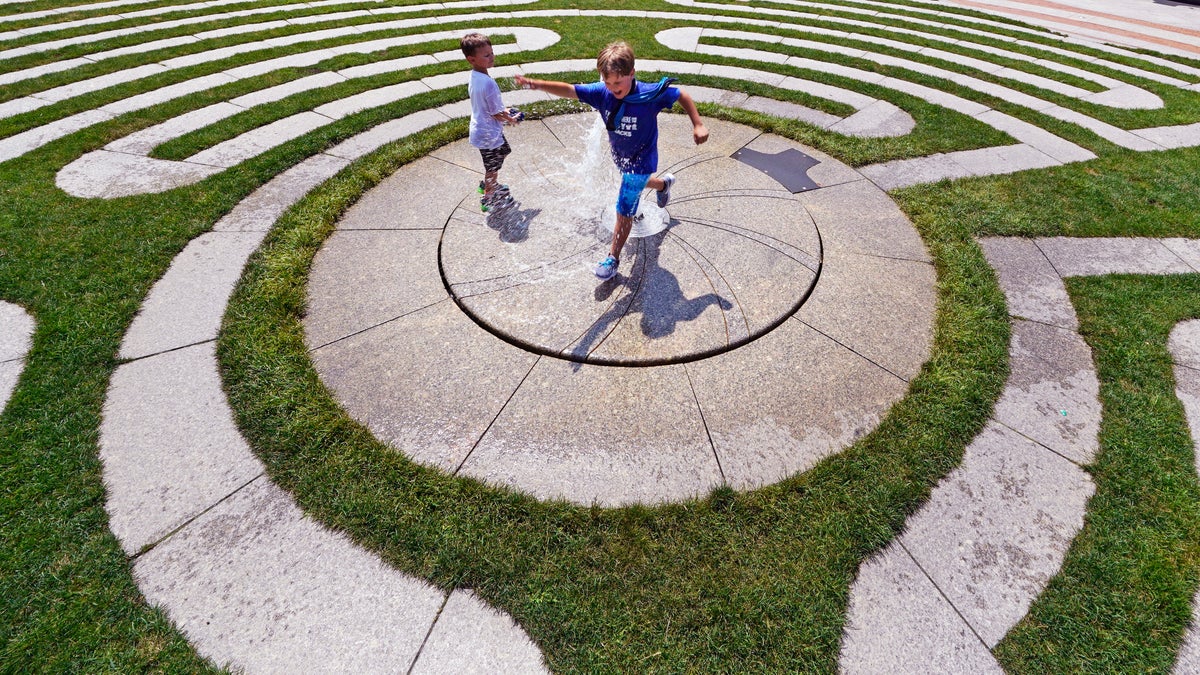
Dangerously high temperatures threatened much of the Northeast and Deep South on Thursday, as huge swaths of the country sweltered under a heat wave that could continue for days and send temperatures soaring in places like Boston, Little Rock and Virginia Beach.
As some temperatures neared 100 degrees Fahrenheit (37.8 degrees Celsius), millions of Americans sought comfort by staying in the shade of homes or in air-conditioned offices, and cooled themselves in fountains, at beaches or in cooling centers.
The heat was expected to extend into the weekend, prompting officials to urge people to seek shelter, as well as to drink lots of water and be good Samaritans by checking on elderly neighbors for signs of distress.
“It’s going to be very hot and humid. Hydrate and stay in shaded areas,” said James Tomasini, a meteorologist in Uptown, New York.
In the New York City area, temperatures will again soar into the 90s — below triple-digit records — but the high moisture in the air will make it feel well over a 100 degrees, he said.
Excessive heat warnings — issued when the heat index surpasses 105 degrees Fahrenheit (40.6 degrees Celsius) continuously for at least two hours — were in effect in parts of the Deep South and pockets of the mid-Atlantic.
Heat advisories extended along the East Coast, from South Carolina to southern Maine.
In Boston, residents and visitors were doing their best to cool down during the third of what could be a six-day stretch of 90-plus temperatures.
Boston Mayor Michelle Wu on Thursday extended a previously announced heat emergency in the city through Sunday and urged resident to take advantage of cooling centers and splash pads.
Nancy Cahill took her young grandsons to the New England Aquarium and stopped by one of those splash pads on the Rose Kennedy Greenway on the way out.
“We are very fortunate that we have access to pools,” said Cahill, 63, who lives in Wakefield, about 15 miles north of the city. “We’re also fortunate because we have air conditioning. I feel bad for those people who don’t have that right now.”
Josh Austin and his wife Michelle traveled down from New Hampshire with their two young daughters to visit the aquarium and also enjoy the splash pad.
“I’m sure there’s some aspect of this heat wave that is a result of global warming — higher temperatures for longer periods of time,” said Josh, 40, a sustainability manager. “But I think it’s also just typical of New England summers to get these warm stretches.”
In the Tidewater area of southeast Virginia, temperatures were expected to reach nearly the century mark, but humidity will push the heat index beyond 105 degrees, said meteorologist Tim Gingrich.
“People could suffer heat exhaustion and heat stroke if they're outdoors for a significant amount of time,” Gingrich said. “You don’t want to be outdoors in the hottest part of the day.”
Cooling centers sprung up across swaths of the country to provide relief from the stifling heat and high humidities.
At a community center run by the Salvation Army in Brooklyn — one of eight of the organization's facilities opened up across New York City — it was so hot that not a soul was milling about outside, said Capt. Jack Tripari, the chaplain at the facility in a working class neighborhood.
“We are trying to supply them with water and a nice cool place,” he said.
People seeking relief from the heat have trickled in sporadically, staying for about a half hour or so before heading back into the heat.
“We’ve had some families that come on with their children. Some have gone out to do run some errands and find themselves a little too hot. And so they step in and try to cool down for a little bit. We’ve had older people, elderly people who might have been waiting for the bus for a little bit,” Tripari said.
This summer is shaping up to be one of the hottest on record — not just in the United States but across Europe and other parts of the globe.
In Arkansas, a combination of searing temperatures and moist air across much of the state prompted warnings about excessive heat — which could cause some people to succumb to heat stroke and other weather-related ailments.
_____
Calvan reported from New York.







